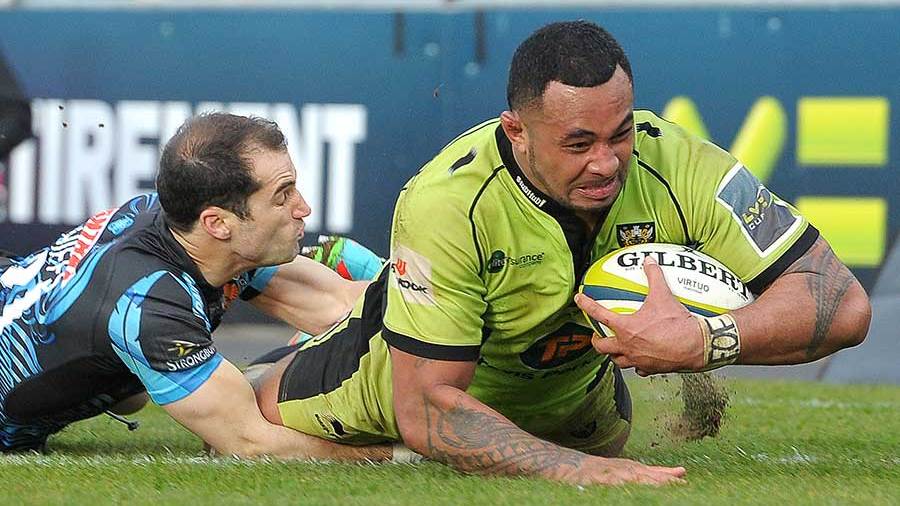Ready to rumble?
Welcome to full-contact cheerleading
ESPN Magazine in the USA recently ran a poll asking which sport not usually covered people wanted to read about. Rugby came out top with 30%, edging out wrestling (26%) and roller derby (no, us neither) with 24%. So with a guiding hand from Tom Hamilton, here's what they came up with to help build up the USA-All Blacks game.
'That Samu Manoa guy' in Premiership action © PA Photos
When a championship steps onto Soldier Field on November 1, it won't be the Seahawks - it'll be the world's top-ranked rugby squad, New Zealand, facing the 18th-ranked Americans in what USA Rugby CEO Nigel Melville calls the "biggest game in U.S. rugby history". With some 55,000 tickets sold so far, it's crushed the US home rugby attendance record of 20,181. Think rugby is just a shirt style? With help from ESPNscrum.com, we tackle your ignorance.
1) What the heck is going on?
It's 15 players per side, two 40-minute halves. You advance the ball by running or kicking it downfield. Laterals are OK, forward passes are not (think Stanford-Cal's The Play). You get three points for a dropkick through the uprights (think field goal), five for running the ball past the goal line and setting it down for a try (think TD), two for the kick-after. Easy!
5.6
Meters of distance between the goalposts on a standard rugby field, the same as in the NFL.
2) So what's with those scrums?
After violations, the ball is rolled between the two sides; eight players from each team huddle and try to push each other back to grab it. Even more fun? When the ball goes out of bounds for a throw-in, the two teams line up a meter apart. As the ball is tossed into the air, players fling their team-mates upward to try to gain possession (think full-contact cheerleading).
17
Average number of scrums per match in the 2011 Rugby World Cup (won by New Zealand, of course).
3) What's the key to the Kiwis?
In their first official match ever, in 1903, the Kiwis defeated Australia 22-3. And they haven't lost much since, winning 76% of international matches in their history. Today, New Zealand may be the most rugby-mad country on the planet, and the All Blacks are as good as ever, having gone undefeated in their last 20 matches. In their last 41, they've lost only once.
46%
Kiwis who watched the 2011 Cup Final; a third of Americans viewed the last Super Bowl.
4) Is there a chance we might win?
Uh, no. U.S. coach Mike Tolkin compares the match to minor leaguers playing the '27 Yankees. In 111 years, the only nations to beat New Zealand are Wales, England, France, Australia and South Africa. (The Kiwis are 3-0 vs. the U.S., with wins in 1913, '80 and '91.) Says Tolkin: "If it's a big margin, so be it. If it's a small margin, great. If we leave our guts on the field, that's success for us."
12
Number of international teams, according to Tolkin, that can compete with New Zealand.
5) rugby: The future sport of the future?
A few years ago, when U.S. star Samu Manoa was playing for a San Francisco club, he had to work as a cement mixer to pay the bills. But interest is growing. And to be fair, we are the reigning Olympic champs; the sport last appeared in the '24 Games, and our boys took gold. That's news only because rugby is making a return to the Olympics in 2016.
83 %
Increase in U.S. rugby participation from 2007 to 2010, according to a 2011 study.
6) Who should I watch?
That Manoa guy. He was spotted three years ago by a scout for a team in England's Aviva Premiership and has since emerged as a powerhouse. This past season, he was a finalist for the league's player of the year award. At 6-6, 269 pounds, he has said, "Hitting people is what I like." But Manoa also runs the ball well and has deft hands and a heralded rugby IQ.
158
Manoa's league-leading carries at his position (the next guy had 121). The upshot: He's a ball hawk.
© ESPN Sports Media Ltd


